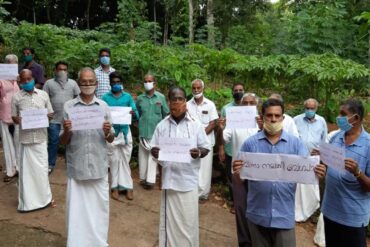It is all too well that the proposal to include income earned by NRIs, especially those working in the Gulf countries, for the purpose of determining tax liability has met with a premature death. Otherwise, it would have created serious problems both in terms of tax administration as well as compliance.
In the first place, it is a misconception that Gulf NRIs do not pay tax. There may be no formal personal income tax in the countries of their residence, but the governments there charge hefty amounts from every expatriate in the form of levies, visa fees, insurance, sponsorship fees etc. They also have to pay for the well-being of the national citizens in terms of higher cost of services.
Gulf has one of the highest rates for phone and internet connectivity as the public utilities contribute the major chunk of resources for the employment of the locals. In fact, the expatriates are forced to pay a premium on the inefficiency and lack of productivity by the local population in the respective Gulf countries.
The Gulf governments are well aware of the burden imposed on the expatriates in subsidising the locals. That is why they have been resisting recommendations by multilateral agencies such as IMF and the World Bank for the imposition of personal income tax consistently. Only banks are currently liable to pay tax. There is no tax even on companies as the governments are conscious of the fact that the cost of doing business is very high and further burden on them would make them unviable.
The introduction of VAT at a uniform 5 percent for all products and services across GCC countries has made life further difficult. Even school fees have become prohibitive as every payment, including that for transportation, attracts VAT. The cost of living has gone up steeply since the introduction of VAT that a large number of Gulf NRIs have sent their families back home and are enrolling their children in schools in India.
It is in this context that Finance Minister, Nirmala Sitharaman, had talked about bringing the income earned by NRIs under the tax net sounded ominous for the large number of Indian workers in the Gulf countries, most of whom struggle to make both ends meet. Thankfully, the minister herself clarified a day later that there was some confusion about the proposal and the government was not contemplating any such move.
“What we are doing now is that the income of an NRI generated in India will be taxed here. If he’s earning something in a jurisdiction where there is no tax, why will I include that into mine that has been generated there,” she clarified in a post-budget interaction with the media.
“I am not taxing what you’re earning in Dubai but that property which is giving you a rent here, you may be an NRI, you may be living there but that is revenue being generated here for you. So that’s the issue,” she added.
But she did not clarify what was new with such a position. All income earned by NRIs in India was already subjected to taxation. So her new take on the issue is absolutely irrelevant and has only created confusion and apprehension in the minds of large number of Indian expatriates, particularly in the Gulf countries.
The wrong-footed move to target NRIs has had its maximum impact in Kerala, where Nirmala Sitharaman seems to have caused big damage to the prospects of the saffron party to see the lotus bloom in the secular-minded state.
Remittance money is a highly emotive issue in Kerala as most families, particularly in Malabar and central Kerala, have one or more members working in the Arabian Gulf, Europe and the United States. Unlike NRIs hailing from the rest of India, the Kerala expatriates keep close bonds with their families back home. So there is zero tolerance to anything that affects the welfare of NRKs, the popular term used to identify non-resident Keralites.
Half-baked ideas have become a trademark of Nirmala Sitharaman’s tenure as finance minister. There have been numerous occasions when she had to put her foot in the mouth as her remarks led to further confusion and frustration. This, in fact, shows how she has failed to measure up as a finance minister with grip on her ministry. No wonder that she has invited comments that no other predecessor had ever done.
Despite a series of reports about the dim prospects of the economy to hit the growth trail again, she continues to insist that everything is hunky-dory. The sad consequence is that her budget offers no significant solutions to the current ills of the economy.
By arrangement with IPA







